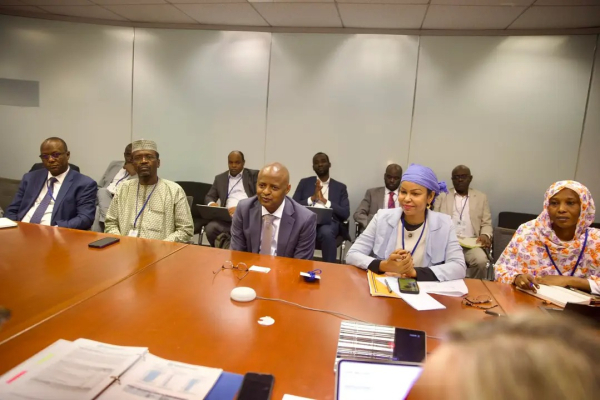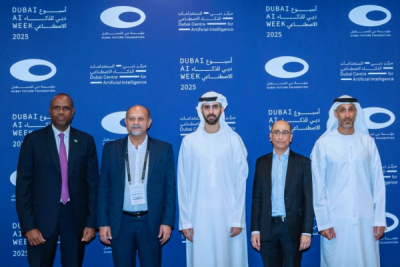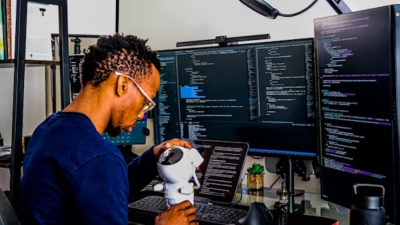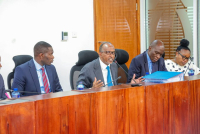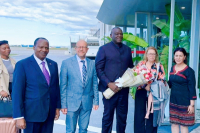- State Minister Nguilin met World Bank officials in Washington on April 24
- Discussions focused on overhauling public services, e-learning, and civil registry digitization
- World Bank signaled readiness to expand support beyond e-procurement to full-service digital platforms
Chad is accelerating its digital transformation efforts and is counting on enhanced support from the World Bank to modernize its public services. On the sidelines of the Spring Meetings in Washington, State Minister Tahir Hamid Nguilin met on Thursday, April 24, with Michel Rogy, the World Bank’s Regional Director for Digital Development, and Jana Kunicova, Sector Director for West and Central Africa, to discuss the way forward.
During the meeting, the Chadian official stressed the urgent need to overhaul financial administrations, improve connectivity, and leverage digital technologies to make government services more accessible, efficient, and transparent. The government has identified key priorities, including the digitization of civil registry records, the digital transformation of school curricula, the expansion of e-learning, and the promotion of local innovation.
These goals are part of the Digital Transformation Support Project, already funded by the World Bank. Launched six months ago, the project has reached a disbursement rate of 8%, which the institution has welcomed as a promising sign. The World Bank reiterated its willingness to go beyond e-procurement support by helping establish an integrated digital platform for public services.
Still, accelerating progress will require substantial technical assistance. Chad faces several hurdles: patchy internet connectivity, a shortage of digital skills, and fragile infrastructure. Enhanced backing from the World Bank could help foster a structured, inclusive, and sustainable digital ecosystem—one designed to improve access to public services and strengthen governance.
According to the ICT Development Index 2024 published by the International Telecommunication Union, only 12.2% of Chadians currently have internet access. The country faces a stark digital divide between urban and rural areas. Additionally, Chad scores just 0.1194 out of 1 on the digital infrastructure development index—one of the lowest ratings globally. Against this backdrop, the World Bank’s support could play a critical role in building a coherent and resilient digital ecosystem that serves citizens and enhances effective governance.
By Samira Njoya,
Editing by Sèna D. B. de Sodji
In Nigeria, where accessing healthcare presents a significant hurdle, the platform DoktorConnect is leveraging technology to revolutionize the system. Its goals include reducing patient wait times at hospitals and alleviating the strain on often-overcrowded public health facilities.
DoktorConnect, a Nigerian-developed e-health solution, enables users to consult certified doctors via smartphone through messaging, voice, or video calls. The startup, with bases in Ikeja, Nigeria, and El Paso, United States, was founded in 2020 and has been led by Joseph Olowe since February 2021.
We "benchmarks your genomics against your wellness result to design an evidence-based lifestyle management plan for you. A digital platform that facilitates consultations with licensed doctors, both virtually and in person, using smart medical IoT devices for real-time vital signs tracking and remote patient monitoring," the healthtech says.
Its solution features a mobile application available on iOS and Android, where it has been downloaded over 10,000 times, according to the Google Play Store. Users create an account to access services ranging from medical teleconsultations to prescription delivery, including patient records monitoring.
The app also provides access to specialists such as gynecologists, pediatricians, and cardiologists, along with mental health counseling and personalized chronic disease management. Additional features include the ability to receive electronic prescriptions, access reliable medical information, and schedule medication reminders.
DoktorConnect aims to broaden healthcare access, particularly in urban and semi-urban areas. The platform operates on either a subscription or a pay-per-consultation basis. As part of Africa's expanding healthtech sector, DoktorConnect exemplifies how innovation can address critical needs in a region where challenges related to access, cost, and quality of care are widespread.
By Adoni Conrad Quenum,
Editing by Feriol Bewa
- Rwanda signed a trilateral memorandum of understanding with C4IR UAE and C4IR Malaysia during Dubai AI Week 2025.
- The partnership focuses on ethical, inclusive, and sustainable approaches to AI development.
- Key areas include governance frameworks, skills development, and technological innovation.
On Wednesday, April 23, during Dubai AI Week 2025, Rwanda inked a three-way memorandum of understanding with the Centres for the Fourth Industrial Revolution (C4IR) of the United Arab Emirates and Malaysia. Ambassador John Mirenge, representing the Rwandan government, finalized the agreement, signaling a significant stride in international collaboration on artificial intelligence.
This partnership aims to build on the momentum generated by Rwanda's AI fellowship program and foster deeper collaboration among the three nations. It will support joint efforts in areas such as governance frameworks, skills development, and technological innovation, with a focus on ethical, inclusive, and sustainable methodologies.
The agreement comes after Kigali hosted the inaugural Global Summit on Artificial Intelligence in Africa. That event, which convened experts, government officials, and private sector partners, underscored Rwanda's aspirations in AI and its increasing prominence in global discussions concerning technology governance.
Since 2022, Rwanda has operated its own Centre for the Fourth Industrial Revolution, established in partnership with the World Economic Forum. This center spearheads AI projects and develops appropriate regulatory structures. An ambitious initiative to create 50 artificial intelligence applications over four years was launched this month, aiming to accelerate the digital transformation of key sectors including healthcare, education, agriculture, finance, and public administration. This program aligns with the national digital development strategy and the country's Vision 2050.
This closer relationship could also enable Rwanda to leverage the advanced experience of the United Arab Emirates, which has already integrated AI into numerous government services, and Malaysia’s expertise in applying technological innovation to industry. For Kigali, this represents a strategic opportunity to expedite the growth of its own artificial intelligence ecosystem while solidifying its standing on the global technology stage.
By Samira Njoya,
Editing by Sèna D. B. de Sodji
- Morocco announced an international call for tenders to digitize the national civil registry.
- The digitization effort covers more than 38 million records across 1,821 civil registry offices.
- Phase one involves converting ~27 million paper documents (some dating to 1915) via manual entry and verification.
- Phase two targets ~11 million already-digitized records for auditing, indexing, and securing.
Morocco is launching an international call for tenders to select service providers for a national civil registry digitization project, the Directorate General of Local Authorities announced. The initiative, with a budget exceeding 194 million dirhams, or roughly $20.8 million, aims to overhaul the management of civil registry records and bolster the digitization of public services nationwide. Bids will be opened on May 29 at the Ministry of the Interior in Rabat.
"This project aims to establish a centralized and secure database, connecting all civil registry offices to a unified, high-performance information system," the Interior Ministry stated. "This will enable real-time data exchange with other public institutions, accelerating procedures, improving service quality, and strengthening the digital transformation of Moroccan administration."
The digitization effort will encompass over 38 million records spread across 1,821 civil registry offices throughout the country. It will proceed in two phases. The initial phase involves approximately 27 million paper documents, some dating back to 1915. These documents will undergo meticulous digitization, manual data entry, and rigorous verification to ensure data accuracy. The second phase will cover more than 11 million already-digitized documents, which will be audited, indexed, and secured to guarantee their integrity and traceability.
Selected service providers will be required to adhere to stringent cybersecurity standards and ensure the faithful preservation of the original documents. Payment for services will be phased, allowing for close monitoring of contractual obligations.
The project also includes the development of an integrated information system designed to centralize data while ensuring its seamless connection with other public services. This system will streamline administrative processes, reduce processing times, and ensure consistent service quality across the country.
Furthermore, an electronic portal will be created for citizens, enabling them to conduct various procedures remotely, including requests for birth certificates, family record books, and the registration of births and deaths. This portal is intended to enhance digital inclusion while alleviating pressure on physical administrative counters.
This project aligns with Morocco's national "Digital Morocco 2030" strategy, spearheaded by the Ministry of Digital Transition and Administrative Reform. Through this initiative, the Kingdom seeks to solidify its ambition to become a leading regional player in the digital sphere, leveraging technological innovation to serve its citizens and modernize public administration. The country has already made strides in this direction, digitizing 600 public services, including 300 for citizens, 200 for businesses, and 100 for government agencies.
By Samira Njoya,
Editing by Sèna D. B. de Sodji
Nigeria will host the AfCFTA Hackathon 2025, which will take place at the Landmark Event Centre in Lagos, from May 1–3, 2025. The event will bring together developers, entrepreneurs, and innovators from across Africa to build tech solutions for the continent’s digital trade challenges.
Themed “Empowering Youth for Africa’s Future Trade,” the event aims to drive innovation in areas such as e-commerce, digital payments, logistics, and digital identity. Participants will work on ideas that enhance cross-border trade under the African Continental Free Trade Area (AfCFTA).
The hackathon supports AfCFTA’s broader goals of economic integration and trade facilitation, with winning ideas potentially piloted for real-world application.
Tanmeyah, a subsidiary of EFG Holding and a leader in microfinance, has partnered with AMAN Holding, the fintech arm of Raya Holding, to enhance digital financial services for customers across Egypt.
The agreement, announced April 22, will allow Tanmeyah customers to receive financing and make payments digitally, including through AMAN’s retail network, available seven days a week, removing the need for branch visits or limited service hours.
The partnership will advance Egypt’s digital transformation and financial inclusion agenda by offering simplified, tech-enabled solutions to individuals and microenterprises.
Global leaders from government, industry, academia, and civil society will gather in Geneva from 7 to 11 July for the World Summit on the Information Society (WSIS)+20 High-Level Event 2025. The WSIS Forum coordinates action on using digital technologies for development.
Hosted by the International Telecommunication Union (ITU) and the Swiss Confederation, the event is co-organized with UNESCO, UNDP, UNCTAD, and over 40 UN partners. It will be held at the Palexpo center alongside the AI for Good Global Summit 2025.
This year’s event will review progress, explore challenges like AI, and help shape the WSIS agenda beyond 2025, ahead of a formal UN General Assembly review in September. It will highlight emerging tech trends and foster global cooperation on digital transformation.
The UNICEF StartUp Lab is accepting applications for its next cohort of startups. This six-month accelerator supports innovative solutions tackling key development challenges in health, education, WASH (Water, Sanitation and Hygiene), climate action, child protection, finance, agriculture, and emerging digital technologies.
The program provides startups with up to GHS 75,000 in prototyping funds and scale-up grants of GHS 150,000 each for three standout ventures. Startups will also gain access to mentorship from UNICEF program experts and connections to its global network of country offices and partners.
To be eligible, startups must be registered and operational in Ghana for at least one year, with technology as a core component of their business model. Solutions must address at least one Sustainable Development Goal (SDG).
The reform represents a significant stride towards achieving equitable, accessible, and quality healthcare for all Kenyans, leveraging digital innovations to overcome longstanding challenges in the health sector.
On April 22, Cabinet Secretary for Health Aden Duale held a consultative meeting with the National Assembly Committee on Delegated Legislation, chaired by Hon. Samuel Chepkonga (MP, Ainabkoi), at Bunge Towers, Nairobi. The session focused on reviewing the Digital Health (Health Information Management Procedures) Regulations, 2025, ensuring they align with earlier parliamentary recommendations and effectively support the rollout of Universal Health Coverage (UHC).
During the meeting, CS Duale announced the operationalization of USSD code *147#, now in use to help Kenyans transition from the National Health Insurance Fund (NHIF) to the Social Health Authority (SHA)—a major milestone in Kenya’s ongoing healthcare reforms. The discussions also emphasized the need for robust public awareness campaigns, particularly at the grassroots level, to increase understanding and uptake of SHA services.
Kenya’s journey toward UHC has been a long-standing national priority. The NHIF, established in 1966, served as the country’s primary public health insurer for more than five decades. However, persistent challenges, such as limited coverage among informal sector workers and operational inefficiencies, prompted comprehensive reforms. These efforts culminated in the creation of the SHA in 2023, designed to provide more inclusive and sustainable health financing.
To further support this transformation, Kenya enacted the Digital Health Act in October 2023, laying the legal foundation for the safe and effective use of technology in healthcare. The Act enhances data privacy and security while establishing standards for digital health services such as telemedicine and mobile health platforms.
Through the revision of digital health regulations and the integration of user-friendly access channels like the USSD platform, Kenya is building a more accessible, affordable, and efficient healthcare system—one that is digitally empowered and truly inclusive.
Hikmatu Bilali
- Augustin Kibassa Maliba began an official visit on April 22 to strengthen digital ties with Tunisia
- Key meetings include sessions with Tunisia’s Ministry of Communication Technologies, ICT Federation (UTICA), and the African Business Council (TABC)
- Discussions center on digital transformation, postal modernization, and entrepreneurship collaboration
Congolese Minister of Posts, Telecommunications and Digital, Augustin Kibassa Maliba, began an official visit to Tunis on Tuesday, April 22, as part of an ambitious initiative to bolster bilateral digital cooperation between the Democratic Republic of Congo and Tunisia.
During his stay, Minister Kibassa Maliba is scheduled for several key meetings, including a bilateral ministerial session at the Tunisian Ministry of Communication Technologies. He will also attend a presentation on the Ecom@Africa platform and postal services, and engage in discussions with the Tunisian ICT Federation (UTICA) and the Tunisian African Business Council (TABC).
The visit includes an immersive experience within the Smart Tunisian Technoparks (S2T) ecosystem, recognized for its programs supporting entrepreneurship and innovation, its research and training initiatives, as well as its internationalization strategies and networking of technological ecosystems.
A central focus of the discussions will be the proposed creation of a Technopark in Kinshasa, with the aim that exchanges with Tunisian digital stakeholders will lay the groundwork for enhanced technical collaboration. This mission aligns with a broader strategy by the Congolese government to structure an effective digital ecosystem, support local tech entrepreneurship, and connect the DRC to regional innovation hubs.
Tunisia has established itself as a significant technological player in Africa. According to the International Telecommunication Union’s (ITU) “Measuring Digital Development – Facts and Figures 2024” report, 92.8% of the Tunisian population uses the internet, a figure considerably higher than the global average of 70.5%. The country’s ICT Development Index (IDI) score is 77.2 out of 100, reflecting continuous progress.
In e-governance, the United Nations’ “UN E-Government Survey 2024: The Future of Digital Government” ranks Tunisia 87th globally (EGDI score: 0.6935), placing it third in Africa behind South Africa (0.8616) and Mauritius (0.7506).
Should these partnerships materialize, the DRC stands to gain from Tunisia’s expertise in digital governance, modernization of postal services, development of technological ecosystems, and support for entrepreneurial innovation. This collaboration would facilitate the transfer of skills in strategic sectors and expedite the digitization of postal services. It would also foster the implementation of joint projects, the sharing of best practices in integrating online public services, and the enhancement of the Congolese ecosystem’s connection to African digital and logistics networks.
By Samira Njoya,
Editing by Sèna D. B. de Sodji
More...
- Algeria inaugurates rapid prototyping platform at Ouzera University
- The platform supports students with innovative projects, aligning with the national strategy to build a knowledge economy
- It features advanced tools including 3D printing, laser cutting, and modeling equipment
Algeria's Minister of Higher Education and Scientific Research, Kamel Baddari (photo, center), inaugurated a rapid prototyping platform at the University of Ouzera in Médéa province on Tuesday, April 22, aiming to empower students with innovative projects. The facility aligns with the national strategy to position universities as key drivers of the knowledge economy.
"The launch of this technological rapid prototyping platform enhances the outcomes of scientific research, provides students with an avenue to establish startups, and reinforces the strategic role of students in wealth generation and the advancement of the knowledge and innovation economy," Minister Baddari said during the inauguration ceremony.
Equipped with sophisticated modeling tools, laser cutting, and 3D printing capabilities, the platform expedites the design and production of functional prototypes. This offers project developers the chance to realize their concepts more swiftly while lowering manufacturing expenses. It bolsters a growing technological ecosystem within Algerian universities, following the recent introduction of a national cloud computing platform, a drone design and control system, and a university incubator focused on entrepreneurship and innovation.
This initiative is part of a broader push to support the entrepreneurial landscape in Algeria. In recent years, the government has expanded support mechanisms for young project holders through the establishment of support structures such as the National Agency for the Promotion of Incubators (ANPI), startup development centers across various regions, and funding mechanisms like the Algerian Startup Fund, which has been allocated several billion dinars.
Currently, Algeria has several hundred officially registered startups operating in crucial sectors including digital technology, fintech, healthcare, and smart agriculture. The development of technological platforms within universities, such as the one in Ouzera, further strengthens an environment conducive to the emergence of a generation of innovators capable of actively contributing to the country's economic diversification.
By Samira Njoya,
Editing by Sèna D. B. de Sodji
- The Central Procurement Office for Medicines (CAMME) finalized the national installation of mSupply software across all healthcare facilities.
- The system enhances drug stock management, traceability, and supply planning, aiming to reduce stockouts and medication losses.
Djibouti's Central Procurement Office for Medicines and Essential Supplies (CAMME) announced Monday, April 21, the completion of the mSupply software installation across all healthcare facilities nationwide. This milestone represents a significant advancement in the digitization of Djibouti’s health system, an initiative that began in 2022 with technical and financial support from partners, most notably the World Bank.
"Thanks to our management system, stock levels, drug traceability, and supply planning are now optimized, thereby strengthening the efficiency, transparency, and responsiveness of the national pharmaceutical system," CAMME stated.
This modernization effort addresses several key strategic challenges, including preventing stockouts, minimizing losses from expired medications, ensuring the efficient distribution of essential medicines, and securing the tracking of health product flows from the central procurement office to healthcare facilities.
The mSupply software, already utilized in approximately 30 countries globally, has demonstrated its effectiveness, particularly in resource-constrained environments. Its implementation in Djibouti is a component of the 2023–2027 National Pharmaceutical Policy rollout. This policy aims to sustainably improve access to essential medicines while guaranteeing their quality, traceability, and availability. The initiative is part of the broader Health System Strengthening Project, financed by the World Bank and underway since February 2023, with the overarching goal of ensuring improved healthcare access for the entire population.
As numerous African nations increasingly adopt digitization to modernize their healthcare systems, Djibouti is underscoring its ambition to leverage technology as a strategic tool for enhancing health system efficiency and ensuring the continuous availability of essential medicines.
By Samira Njoya,
Editing by Sèna D. B. de Sodji
As fintech solutions proliferate across Africa, Cape Town-based startup Happy Pay is carving out a niche with its simplified buy now, pay later (BNPL) service. The company differentiates itself by requiring no upfront deposit and eliminating hidden fees.
South African financial technology startup Happy Pay has developed a solution allowing users to divide their purchase costs into three equal, interest-free monthly installments. This service is directly accessible via the user's bank card or South African bank account, with no initial deposit required.
The company aims to enhance purchase affordability, particularly for online transactions, but also at select brick-and-mortar retail partners.
The Happy Pay application, available on both iOS and Android platforms – where it has garnered over 10,000 downloads according to Play Store metrics – features a user-friendly dashboard. This interface enables users to track upcoming payment dates, review completed payments, access transaction history, and monitor other relevant data. The registration process is streamlined, relying on an analysis of the user's monthly income.
Happy Pay implements a spending limit for its users. The fintech company states that factors such as payment frequency and overall financial well-being influence this limit. In its FAQs, Happy Pay explains that consistent, timely payments increase users’ spending limits. Established in 2021 and headquartered in Cape Town, the fintech was founded by Boitumelo Thulo, David Torr, Maps Maponyane, and Wesley Billett. Happy Pay recently announced a partnership with Peach Payments, an African payments firm, to bolster its expansion within the installment payment sector and simplify the integration of its solution into e-commerce platforms.
Happy Pay primarily targets salaried individuals with a consistent income who may lack access to conventional credit options. The company's objective is to address a growing consumer demand for greater budgetary flexibility and to assist merchants in boosting their sales conversion rates, especially in the online marketplace.
By Adoni Conrad Quenum,
Editing by Feriol Bewa
-
Chad is advancing plans to deploy a smart video surveillance system in its capital, N’Djamena, amid rising crime rates.
-
The system would use high-definition cameras with night vision and behavioral analysis software, connected via a fiber-optic network.
-
Authorities hope the system will help counter organized crime and terrorism, especially near key government sites.
Chad’s capital is moving closer to adopting a high-tech video surveillance system as authorities seek to address growing urban crime. On Thursday, officials from the Ministry of Public Security and Immigration met with international experts to discuss the deployment of an intelligent monitoring network tailored to N’Djamena’s security challenges.
The proposed system would rely on next-generation cameras featuring high-definition sensors, infrared night vision, and behavioral analysis software to detect unusual movements. These devices would be interconnected via a fiber-optic network, supported by reinforced poles, technical cabinets, backup power supplies, and redundant data storage to ensure uninterrupted operation.
The push for modernization follows a surge in criminal activity in N’Djamena since early 2025. If implemented, the system could enhance law enforcement’s ability to counter organized crime and terrorism while improving security around government buildings.
However, the project’s success hinges on key factors: a stable high-speed internet connection, public support, and safeguards to prevent potential overreach and privacy violations.
Chad is not alone in turning to smart surveillance. Neighboring Cameroon has already installed over 3,000 cameras under its Smart City initiative, with plans to expand to 5,000 nationwide. Similar projects in Nigeria, Kenya, and Morocco have also strengthened urban security in recent years.
Should Chad move forward, N’Djamena could join a growing list of African cities leveraging technology to combat crime—balancing safety with civil liberties in an era of digital policing.
By Samira Njoya,
Editing by Sèna D. B. de Sodji


